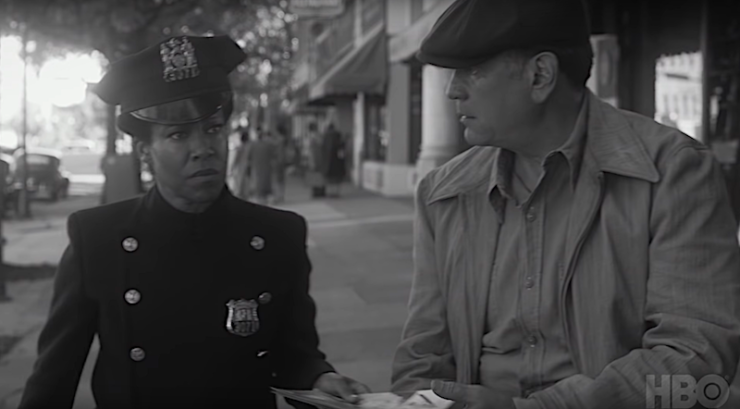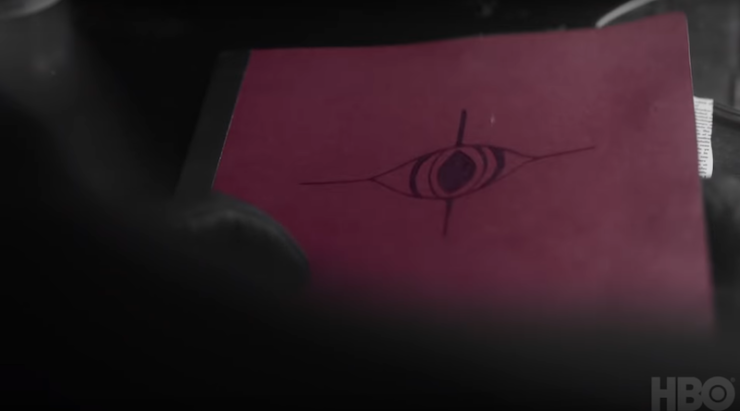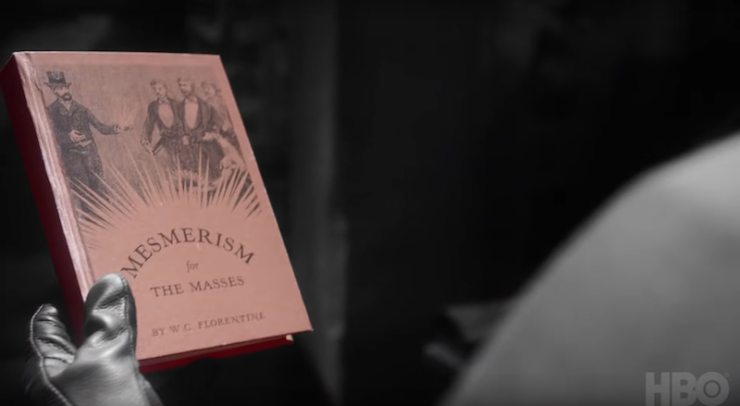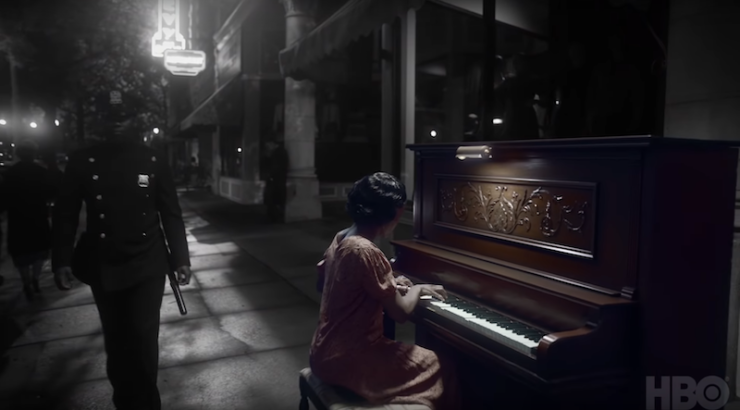What is the price of “Truth, Justice, and The American Way”? Are Truth and Justice only for certain people? Can anyone earn them?
This week’s Watchmen, “This Extraordinary Being”, takes us into the youth of Will Reeves, via Angela Abar’s Nostalgia trip. It’s amazing, and brilliantly shot, with an interplay of super saturated black-and-white and tiny highlights of color that turns the episode into some unholy baby of Schindler’s List and Sin City.
And yes, that Nazi rally at Madison Square Garden is ALSO real. (Just like the Tulsa Massacre.) It took place in 1939, and about 20,000 “humans” attended it.
Last Week, On Watchmen:

Oh, show, I just have one question.
WHY.
Why do you do this to me. You give me a character, he’s my favorite character, you give me an origin episode that makes me love his poor little complicated heart even more than I already did, and then you (probably) waste him.
I mean, maybe he got away? I guess I’ll update these thought real quick of he lives. But for right now, ruminating on the events of last week, I have to assume that Looking Glass is toast.
But here, let me gather some thoughts. Last week’s episode was an incredible exploration of trauma and PTSD. The way the script gradually layers in what a post-Squid reality looks like is chilling, and a great addition to the previous weeks’ episodes. We’ve see people wearily pulling over for BB Squid drills, we’ve seen people frothing at the mouth about “Redfordations”, and we’ve watched the way real-life superheroes are incorporated into pop culture like American Hero Story. (Some of us even thought they saw some porn in the mix, but, well, some of us hit publish too dang fast.) But last week we finally got to see how ordinary folk live in a world that suffered a Squid Attack.
Wade has a bunker and an alarm system so he can duck and cover if another major squid hits. He’s lined his hats with Reflectatine because it’s said to protect the wearer from the overwhelming psychic terror that weighs on people who were anywhere near New York on 11/2. And in a goddamn genius turn, the show also gives us different levels of response. Obviously Laurie was THERE, and she’s one of those types of people who wears her world-weariness as both armor and a badge, and probably regards anyone who wasn’t THERE as lesser, PTSD-wise. Wade was almost THERE. He was in Hoboken, he only survived because of a freak occurrence that would have been the worst thing that ever happened to him if the Squid hadn’t hit a second later. The experience broke him, but it also shaped who he is now. He has created a life in response to his fear. Everything from his work as a cop to his failed relationships to his work as a focus group analyst are reactions to the fear that never fully leaves him.
A Black man in the Friends-of-Nemo meeting refers to “transgenerational trauma”—basically the idea that the children of those who experienced a great, world-shattering trauma can also develop PTSD based in their interactions with the survivors. So, generations of Black kids can suffer because of their ancestors’ experiences under slavery, the children of Holocaust survivors or refugees can also have a deep sense of instability and terror. Basically: humans are complicated, brains are complicated, and the past is never really past.
But even better still: the woman who woos and then betrays Wade? Her trauma comes solely from watching a Spielberg movie about the Squid. Now Wade could have dismissed her, scoffed in her face, told her watching a movie is Not The Same Thing—but he’s not like Laurie. He listens and accepts her. He acknowledges that seeing the event on film is its own kind of trauma. That the idea of something can live in a person’s mind and fester into obsession, until the viewer’s fear is ruling their life the same as if the thing happened to them. Again: Brains? Complicated af.
The show did such an incredible job of showing us different types of trauma, different responses to it, and then Tim Blake Nelson turned in an unbelievable performance when Wade learns the truth, and is traumatized all over again. First he see the portals and thinks his worst fear has come to life, and that people are actively courting another Squid Attack. But then of course he learns the the truth is SO MUCH WORSE than his fears.
Speaking of trauma from watching upsetting stuff, I’m never getting over The Death of the Clone Puppy.
Again, show: WHY.
We’re all in the tunnel, indeed. Is there a light at the end?
This Week, On Watchmen:

This episode! I honestly haven’t ever seen an hour of television like this. While last week riveting, and my favorite so far, it was also just a great example of prestige peak TV. This, though, chopped and screwed history together, wove moments from the far past into the near past, and flicked and flitted through sensation and trauma in exactly the way human memory actually works.
It felt more like Eternal Sunshine of the Spotless Mind than a superhero story?
I’m just extraordinarily happy right now?
Last week Angela downed a mouthful of Nostalgia to try to protect her granddad, Will Reeves. Now she travels into her grandfather’s past and experiences the events and horrors that turned Will Reeves into a masked vigilante. He’s the first Black beat cop, but of course runs up against conspiracies within the force. After a group of fellow officers attacks him, he starts fighting crime in secret, while researching a much larger white superacist conspiracy. Along the way he marries and has a child, while in the present, Laurie and Cal try to get Angela to come back to the present.
Here Be A Black Freighter Full of Spoilers:

OK so as everyone suspected, Will Reeves (played as a young man by Jovan Adepo, and in his elder form by Louis Gossett Jr.) was Hooded Justice, the first true superhero of the Watchmenverse. He does seem to have at least slight superstrength? And his inciting trauma? the reason he wears a mask?
A trio of shithead racist cops jumped him, beat him, and lynched him. They cut him down but told him to “keep his Black nose out of white folks’ business.” And his response to that was to wear the hood and the cut noose as a costume, and rescue people from crime.
This is, hands down, the best origin story I’ve ever fucking seen.
What makes it even better is that a few days before the lynching he and a newsstand guy discuss Action Comics #1. What makes it even still yet better is that the first crime he tries to thwart (as a cop, not as Hooded Justice) is the arson of a Jewish deli. What’s even best is that, as I mentioned above, the episode makes direct reference to the Madison Square Garden Nazi rally. Once again Watchmen goes out of its way to excavate racism and anti-Semitism in history, and show how it echoes into the present.
His justice work inspired the Minutemen, who are shadowy figured behind Captain Metropolis. He does have a romantic relationship with Metropolis, but he doesn’t keep the mask on as any sort of barrier to intimacy—rather it’s Metropolis who tells him to wear the mask and hood since some of the Minutemen are racist. In the end the Minutemen are far more interested in photo ops than in actually solving crime, however, and it’s left to Justice to take out a conspiracy that involves hypnotizing Black moviegoers and driving them to riot.
Essentially about a half step removed from the psychic damage the Squid Attack is supposed to have caused.
Will swipes one of the mesmerizing film projectors, but his life has already been pretty well warped by his dedication to justice. His heroism drives his wife and child away. And Angela learns the truth of what happened to Chief Judd back at the end of Episode One.
But can I just pause for a moment to reflect on the fact that this show has given us a bisexual Black hero? That it’s recast Superman’s origin with a pair of traumatized Black children who grow up and get married and have a kid who eventually leads to the awesomeness that is Angela Abar?
As frustrating and upsetting as it is to watch the Minutemen lie and dismiss Will, and as upsetting it is that Will cheats on Julia, there are kernels of a different kind of life, and a different kind of America in there.
But for now, Angela has awoken under the care of Lady Trieu.
This should go great.
Allusions:
- Will paints his face white under his hood (so people will assume he’s a white hero) in a nice mirror of Angela spraying her face with black paint under her wimple.
- Hooded Justice and Metropolis have the illicit relationship that’s implied in the Watchmen comics and in American Hero Story.
- This week’s scene from American Hero Story touches on Metropolis’ betrayal of Justice, although in life the betrayal came when Metropolis refused to help him fight white supremacy, not because he was cheating on him.
- The Cyclops sigil looks disturbingly similar to a Squid’s eye, doesn’t it?
- Obviously Will and Julia’s story mirror Superman’s like, a lot.
- Also Will’s first act of heroism is to save a couple from a mugging in an alley. I didn’t see any impressionable Bat-phobic children with them, though.
- Truth/Trieu; Law/Justice; Hood/Mask; Noose/Garrote











There’s another allusion in this episode. At least, I’m pretty sure it must have been put in there on purpose.
Remember the guy Will tried to arrest? Gave his name as Fred. In the later scene where Will shoots him, he was hanging around next to a meat delivery truck, possibly his, bearing the name “F.T. and Sons”.
Can we think of a real, historical person whose initials were F.T.; who started a supermarket chain, and later went into business with his sons; who was well known for his racism (having once been arrested for taking part in a Klan march); and was a stocky, balding guy with a moustache?
Why yes we can. His name was Fred Trump.
I have this fantasy, likely never to happen, that Alan Moore will finally watch something like tonight’s episode and declare that someone built something solid, even amazing, on top of his original work. Maybe it’s happened in an alternate universe.
I also feel inclined to forgive Damon Lindelof for his past storytelling sins that caused frustration and annoyance for many. This is a redeeming work of art. It is an excellent hour of TV. The handling of racism in American history is superior to just about any other scripted show I can think of. Certainly far better than what American Gods did with historical events in Cairo, Illinois. That show botched things badly, even suggesting the black folks in town were partly responsible. It was ugly as hell.
Making Hooded Justice a black man was a brilliant subversion of the original comic, where HJ was hinted (by Hollis Mason) to be a Nazi sympathizer and Captain metropolis a racist.
Clever inception from Cyclops to mesmerism to the future squid attack. The cyclopean eye is even an element in Qzymandias’ golden costume. Is Ozy also a secret white supremacist?
Oh, if Lindelof doesn’t stick the landing in the next three episodes, I’ll rescind and retract the warm feelings I have for this show right now. And seriously Mr. Moore, watch this episode.
@1 – holy shit, nice catch. That had to be intentional.
Now to pop some popcorn and wait for all the angry racists to scream ineffectively about HJ being a black man.
I can’t really disagree with anything Leah says here. But I found this episode ultimately unsatisfying, because for me it tipped over into a failure of the suspension of disbelief. From a storytelling perspective it works to make HJ a black man in disguise, although it’s the closest the series has come to contradicting the comic rather than expanding on it (the fight with the Comedian makes it pretty clear that violence _is_ a sex thing for the comics HJ, and it’s strongly hinted that he was the German strongman who was murdered by the Comedian). But then taking memories in pill form feels like a cheat code to get out of framing an extended flashback – it reminded me of nothing so much as Harry Potter’s pensieve, which worked fine in a (theoretically) young adult series but clunks for me here, that’s just not how memories work. And then mind control via strobe lights – stretches disbelief in the riot incitement, and then shatters it completely at the climax. A handheld flashlight is enough to turn someone into a “go commit suicide now” robot? Sorry. Both of those things aren’t external magic or impossible-technology elements, which come with the territory, but changes in how _people_ work, which are always less satisfying for me. As always, YMMV, but all that added up pulled me out of the narrative in a way that hasn’t happened with earlier episodes. As Leah describes though, the episode as a critique of the history of race in America – wow. Like Toni Morrison taught us, the present is shaped and constrained and warped by the past, and this episode handles that powerfully and gracefully.
If I sound like I’m of two minds about the episode it’s because I am.
S
I must say that this sounds like quite the episode (and it’s especially fun to read that – in this version of the WATCHMAN setting* – Hooded Justice is, in essence, one Hulk sized FU to Lynch Mobs).
Honestly, it will be interesting to see what this show does with Nite Owls I & II should they actually decide to make use of those characters as something other than background elements; hopefully they’ll keep Hollis Mason a man making honest guesses and occasionally making mistakes in the process, rather than a deliberately deceptive source.
*When it comes to superheroes, it always seems wisest to err on the side of a fantastically mutable Multiverse rather than a single hard-and-fast continuity (after all, the former allows you more toys to play with).
Help a poor viewer out—who is the white Hooded Justice who beats up the “inquisition”team? Was he a replacement for Will after he got disgusted with Metropolis?
@Silvertip: The pills are a cheat code, but cheat codes can be fun. (I once hacked a racing game and turned my car into a rocket, running multiple laps before the rest of the pack did even one.) Weren’t Nostalgia pills already part of the lore, created by Veidt? They don’t get out of framing, the pills serve as the framing medium. Otherwise we would’ve had the old HJ just tell his story to Angela. Louis Gossett is a compelling actor, but would it have been as good as Carrie Coon’s performance in the last Leftovers episode, telling, not showing?
The flashlight didn’t bother me. Either you accept mesmerism as a thing, or you don’t. The device or method isn’t particularly relevant. And it may tie in to the squid attack. Maybe it wasn’t just a psychic backlash as in the comics. Maybe Veidt built on the KKK technology to incite violence as well. He’s on trial next week, so we may get further evidence of his misdeeds and how he accomplished them.
@7. marie: he’s just an actor in the recreation for the supposed documentary segments in American Hero Story everyone’s watching on TV. They aren’t particularly accurate.
@8 I remember a line of Nostalgia perfumes and so on (I think it’s a bottle of it that Laurie breaks) but I don’t remember the memory pills. But the secondary documents are so layered it may well be in there somewhere.
S
Don’t worry about the clone puppy. All the box does is remove the Intrinsic Field from whatever is inside it.
And now the blue superdog is playing on the fields of Mars with his new best friend, Doctor Manhattan, whose heart is warmed by the love of a Very Good Dog, and so will come back to Earth and solve all our problems.
Either that or somebody is going to need to disappear a body in the next three episodes, and they needed to put Chekhov’s Gun on the mantle.
❝The cyclopean eye is even an element in [O]zymandias’ golden costume. Is Ozy also a secret white supremacist?❞
I’ve read the Watchmen comics recently for the first time, and noted that in his published interview towards the end, he likens the 20th century to a race between the 4 horsemen of the apocalypse, and the seventh cavalry. So, like Rorschach, perhaps he also inspired the white supremacists—and yes, I’m aware the 7th cavalry was a real regiment.